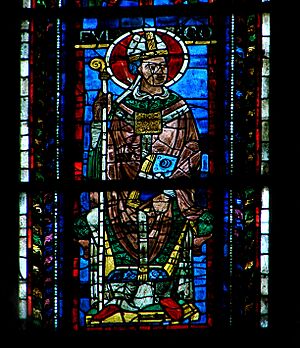Fulk (archbishop of Reims) facts for kids
Fulk the Venerable (died June 17, 900) was an important leader of the church in France. He served as the archbishop of Reims from 883 until his death. Fulk played a big role in the political struggles of the West Frankish kingdom. This kingdom was formed after the large Carolingian Empire broke apart in the late 800s.
Contents
Fulk's Early Life and Role
Fulk was born into a powerful noble family. His brother was Anscar I, a leader in a region called Ivrea. Fulk became a church official working for Charles the Bald, who was a king. By 877, he was made the head of the abbey of Saint Bertin. This abbey was a type of monastery near Saint-Omer, France.
Becoming Archbishop of Reims
In March 883, Fulk became the archbishop of Reims. He took over from Hincmar, who had been archbishop for a long time. As archbishop, Fulk wrote many letters to rulers, other bishops, and even popes. These letters were about important political and religious issues.
Much of what we know about Fulk comes from a historian named Flodoard. Flodoard wrote a book called History of the Church of Reims around 948-952. This book tells Fulk's life story. It also includes summaries of about 76 of his letters. Half of these letters were sent to or from popes. Fulk even wrote to Alfred the Great, the king of England, about the needs of the English church. He also criticized Queen Richilde for what he thought was improper behavior.
Political Struggles and Kings
After the Carolingian emperor Charles the Fat was removed from power in 887, Fulk tried to make his relative, Guy III, the king of West Francia. Fulk even crowned Guy at Langres in 888.
Supporting Different Kings
However, Odo, a powerful count from Paris, was crowned king by another archbishop. The nobles accepted Odo as their king. Fulk did not like that his chosen candidate was passed over. He continued to oppose Odo's rule.
Fulk then looked for another option. He first turned to Arnulf of Carinthia, who had become king in East Francia. But this did not work out either. Fulk eventually decided to support the young Carolingian prince, Charles the Simple. Charles was the son of Louis the Stammerer. He had been passed over in 888 because he was too young.
In 893, Fulk crowned Charles as king, even though Odo was still king. After more conflicts among the kingdom's powerful nobles, an agreement was reached. Charles would become king after Odo. This happened in 898. The rivalries during this time led to many future conflicts between the Carolingian family, Odo's family (the Robertians), and other noble families. When Charles became king, he made Fulk his chancellor. This was a very important position in the king's government.
Education and Later Life
In the late 800s, there were many attacks by Vikings. In 893, Fulk helped to reopen the schools in Reims. He brought in famous teachers like Remigius of Auxerre and Hucbald of Saint-Amand. This helped to bring learning back to the region.
Fulk's Assassination
Political tensions continued to be high. In 900, Fulk was killed. This happened because Count Baldwin of Flanders ordered it. King Charles had given Fulk control of the abbey of St Vaast. This abbey had previously belonged to Baldwin, whom the king suspected of not being loyal.
While Fulk was traveling with a small group to meet King Charles, he was killed. A man named Winemar and his helpers, who worked for Baldwin, carried out the murder. Killing a bishop was very rare during this time. This event shocked people, as shown by different historical accounts. These accounts came from chroniclers like Regino of Prüm, the writer of the Annals of Saint-Vaast, and Flodoard of Reims. Fulk was replaced by Heriveus as archbishop. Heriveus held a church meeting where Winemar was officially removed from the church for his crime.
See also
 In Spanish: Fulquerio de Reims para niños
In Spanish: Fulquerio de Reims para niños
 | Bayard Rustin |
 | Jeannette Carter |
 | Jeremiah A. Brown |


